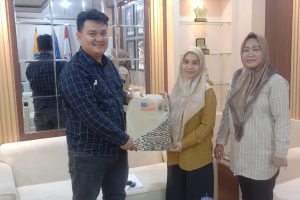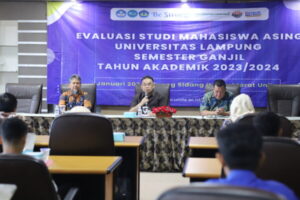Unila Collaborates with NSTU Russia on Accelerator Technology

(Unila): Lampung University (Unila) has signed an MoU with Novosibirsk State Technical University (NSTU) Russia for collaboration in the development of accelerator technology. The MoU was signed online between the Rector of NSTU, Prof. Dr. Sc. Anatoly Bataev and the Rector of Unila, Prof. Dr. Karomani, M.Si., on Tuesday, January 18, 2022.
Representatives from NSTU Russia who witnessed the MoU signing at the second floor of Unila’s Rectorate Building were The NSTU NETI Representative Fedor Leonov, Ph.D., who also served as a translator for the NSTU Rector who joined the event online from Russia.
In his online speech, Anatoly Bataev stated that NSTU and Unila will collaborate in the field of science. He added that NSTU has expertise, especially in radiation technology.
“My hope after the signing of this document is that we can enter into real work so that cooperation with Southeast Asia, Indonesia, and Unila, which is located in Lampung Province, can become closer for the benefit of both countries,” said Fedor Leonov, translating Anatoly Bataev’s speech delivered in Russian.
Anatoly Bataev expressed his gratitude to Unila Rector, Prof. Dr. Karomani, M.Si., and his team for the established collaboration. He hoped that the collaboration could be carried out in the long term.
Unila Rector, Prof. Karomani, briefly explained Unila’s profile, which has 5 doctoral programs, 34 master’s programs, 57 undergraduate programs, 3 professions, and 12 diploma programs in all fields of study, as well as having 8 faculties and a postgraduate program.
“Unila, located in Lampung Province, Indonesia, has great potential for various industrial developments. Currently, the economy in Lampung is supported by the agricultural sector, trade, geothermal and tourism, and it also has a high prospect and rapidly growing in this province,” said Karomani.
Karomani welcomed the collaboration with NSTU in various fields and was enthusiastic about the details of collaboration offered by NSTU in radiation technology.
Furthermore, Karomani mentioned that Unila and NSTU could collaborate in the form of student and faculty exchange, joint research, scientific publications, as well as academic activities supported by both parties.
“Finally, I would like to express my gratitude to all the speakers, committees, and everyone involved,” concluded Karomani in his speech.
Meanwhile, Fedor Leonov, when interviewed during the event, explained that the collaboration offered by NSTU to Unila in the field of radiation technology is in the form of particle accelerator technology that can be used for various aspects of life, including in the fields of industry, agriculture, medicine, environment, national security, and modern technology.
He gave an example that particle accelerator technology can be used to sterilize food products by killing harmful microorganisms through irradiation technology.
“This technology can be used not only for educational purposes but also for commercial purposes. Therefore, I hope that entrepreneurs will be involved in this collaboration in the future,” said Fedor Leonov.
He explained that the development and utilization of particle accelerator technology will require laboratory infrastructure with national security standards. Therefore, Unila and NSTU will assess the licensing requirements in accordance with Indonesian regulations.




